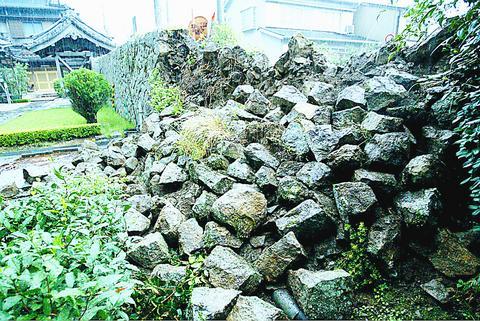Strong aftershocks rattled western Japan early yesterday after two powerful earthquakes the evening before injured 38 people.
Meanwhile, a powerful typhoon hit Japan's southern islands, injuring 21 people, and the Meteorological Agency warned the storm could bring heavy rains and mudslides to areas hit by the temblors.

PHOTO: AP
The two offshore quakes on Sunday -- the first with a magnitude of 6.9, followed by a 7.3-magnitude temblor five hours later -- were felt most strongly in sparsely populated areas in southwestern Wakayama prefecture, about 450km west of Tokyo.
They also shook the major cities of Osaka, Kyoto and Nagoya, and caused buildings to sway in Tokyo.
The National Police Agency said 38 people were hurt, including three people with broken bones. Most were injured in the second, more powerful quake.
Aftershocks continued to rattle the region early yesterday, including a magnitude-5.7 tremor, according to the Meteorological Agency. No damage or injuries were immediately reported.
"A series of magnitude-5 after-shocks could continue up to the next 10 days. They could cause tsunami waves, and I urge people to evacuate to higher ground," public broadcaster NHK quoted Yoshinobu Tsuji, assistant professor at the University of Tokyo's Earthquake Research Institute, as saying yesterday.
Tsunami -- waves triggered by seismic activity -- as high as 90cm were recorded along the Pacific coastline on Sunday, though the Meteorological Agency lifted its tsunami warnings early yesterday.
Kyodo News agency also reported that 600 homes were without electricity, while high-speed train services were temporarily suspended.
Also yesterday, Typhoon Songda was packing winds of up to 144kph as it headed across the East China Sea toward Japan's southernmost main island of Kyushu, the Meteorological Agency said.
Police said 21 people had been injured by the storm and tens of thousands of homes were without electricity.
Though the typhoon is still far away from quake-hit areas, the Meteorological Agency said the storm could bring heavy rains and warned that landslides were increasingly likely following the temblors.
The two quakes late on Sunday occurred far off Japan's Pacific coast, which may have minimized damage.
The first quake was centered about 110km off the coast of Wakayama on the Kii peninsula and 10km beneath the ocean floor.
The second quake was centered about 130km off the coast of Kochi prefecture, also 10km below the seabed.
Authorities said it was too early to say whether the bigger of the two earthquakes was the major jolt the Japanese government had predicted would strike central Japan.

PRECARIOUS RELATIONS: Commentators in Saudi Arabia accuse the UAE of growing too bold, backing forces at odds with Saudi interests in various conflicts A Saudi Arabian media campaign targeting the United Arab Emirates (UAE) has deepened the Gulf’s worst row in years, stoking fears of a damaging fall-out in the financial heart of the Middle East. Fiery accusations of rights abuses and betrayal have circulated for weeks in state-run and social media after a brief conflict in Yemen, where Saudi airstrikes quelled an offensive by UAE-backed separatists. The United Arab Emirates is “investing in chaos and supporting secessionists” from Libya to Yemen and the Horn of Africa, Saudi Arabia’s al-Ekhbariya TV charged in a report this week. Such invective has been unheard of

US President Donald Trump on Saturday warned Canada that if it concludes a trade deal with China, he would impose a 100 percent tariff on all goods coming over the border. Relations between the US and its northern neighbor have been rocky since Trump returned to the White House a year ago, with spats over trade and Canadian Prime Minister Mark Carney decrying a “rupture” in the US-led global order. During a visit to Beijing earlier this month, Carney hailed a “new strategic partnership” with China that resulted in a “preliminary, but landmark trade agreement” to reduce tariffs — but

Chinese President Xi Jinping’s (習近平) purge of his most senior general is driven by his effort to both secure “total control” of his military and root out corruption, US Ambassador to China David Perdue said told Bloomberg Television yesterday. The probe into Zhang Youxia (張又俠), Xi’s second-in-command, announced over the weekend, is a “major development,” Perdue said, citing the family connections the vice chair of China’s apex military commission has with Xi. Chinese authorities said Zhang was being investigated for suspected serious discipline and law violations, without disclosing further details. “I take him at his word that there’s a corruption effort under

China executed 11 people linked to Myanmar criminal gangs, including “key members” of telecom scam operations, state media reported yesterday, as Beijing toughens its response to the sprawling, transnational industry. Fraud compounds where scammers lure Internet users into fake romantic relationships and cryptocurrency investments have flourished across Southeast Asia, including in Myanmar. Initially largely targeting Chinese speakers, the criminal groups behind the compounds have expanded operations into multiple languages to steal from victims around the world. Those conducting the scams are sometimes willing con artists, and other times trafficked foreign nationals forced to work. In the past few years, Beijing has stepped up cooperation